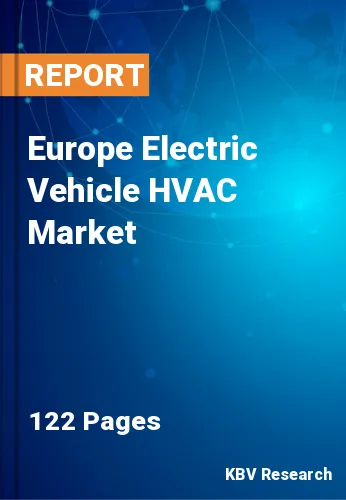The Europe Electric Vehicle HVAC Market would witness market growth of 9.4% CAGR during the forecast period (2023-2030).
The HVAC (heating, ventilation, and air conditioning) system of an electric vehicle (EV) is responsible for thermal management and air quality control. The HVAC system is responsible for sustaining a suitable interior temperature and humidity level for the occupants and maximizing the EV's energy efficiency and range. The HVAC system in an EV operates differently than in a conventional vehicle with a combustion engine. Since no engine block generates heat in an EV, the HVAC system depends on alternative heating means like electric resistance radiators or heat pumps. Heat exchangers transfer heat from the exterior to the interior of a vehicle using refrigerant gas, much like the operation of an air conditioning unit.
The electric compressor circulates a refrigerant to evacuate heat from the vehicle's interior while the condenser releases the heat the process produces. The evaporator cools the air before the compressor and air intakes transport it into the cabin. Given the limited power from the vehicle's battery, such systems are designed to conserve energy. In addition, they frequently incorporate intelligent controls and cutting-edge sensors to boost performance and decrease energy consumption. Therefore, EV HVAC systems are crucial for providing occupants with a comfortable and regulated interior climate and maximizing energy efficiency.
To meet the mandated targets of CO2 emission, suppliers and manufacturers in Europe will need to minimize the level of CO2 emissions by producing HVAC systems that are fuel-efficient. This would contribute to fuel savings and a decrease in environmental pollution. The UK is the second-largest premium vehicle manufacturing location in the world and is recognized for its luxury and sports cars, including those made by Jaguar, Bentley, Rolls-Royce, and Morgan. Different market growth prospects are opening up in the region due to the rise in commercial vehicle sales and technological advancements in HVAC systems.
The Germany market dominated the Europe Electric Vehicle HVAC Market by Country in 2022, and would continue to be a dominant market till 2030; thereby, achieving a market value of $570.2 Million by 2030. The UK market is estimated to witness a CAGR of 8.4% during (2023 - 2030). Additionally, The France market would showcase a CAGR of 10.3% during (2023 - 2030).
Based on Technology, the market is segmented into BEV, and PHEV. Based on Component, the market is segmented into Condenser, Compressor, Heater Core, Evaporator, and Others. Based on Vehicle Type, the market is segmented into Passenger Vehicle, and Commercial Vehicle. Based on countries, the market is segmented into Germany, UK, France, Russia, Spain, Italy, and Rest of Europe.
Free Valuable Insights: The Worldwide Electric Vehicle HVAC Market is Projected to reach USD 9.3 Billion by 2030, at a CAGR of 10.1%
The market research report covers the analysis of key stake holders of the market. Key companies profiled in the report include Valeo SA, Hanon Systems (Hahn & Co. Auto Holdings Co., Ltd.), Toyota Industries Corporation, Mahle GmbH (Mahle Stiftung GmbH), Panasonic Holdings Corporation, Johnson Electric Holdings Limited, Sanden Corporation (Hisense Home Appliances Group Co., Ltd), Marelli Holdings Co., Ltd., Denso Corporation, and Brose Fahrzeugteile SE & Co. KG
By Technology
By Component
By Vehicle Type
By Country
Our team of dedicated experts can provide you with attractive expansion opportunities for your business.

